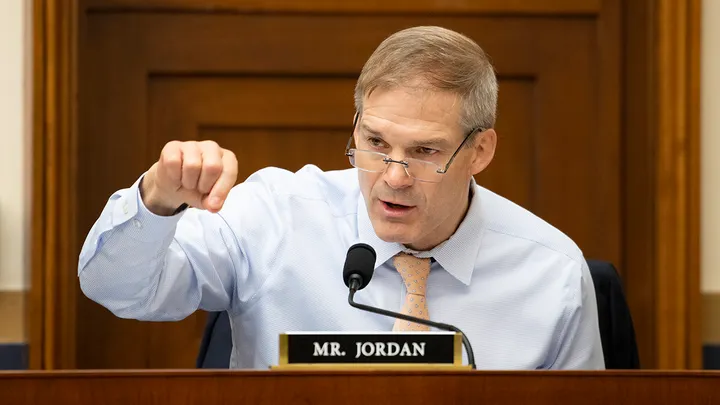Rep. Jim Jordan might wrangle enough votes to become speaker; if he doesn’t, what then?
For the past week, the Congress has been in a state of confusion. It started earlier in the month when we narrowly avoided a partial government shutdown, and the chaos continues with a leadership crisis in the GOP.
Democratic lawmakers are quick to deride the confusion, while Republicans remain uncertain about what the future holds in this ongoing process. However, there are some ways to bring some clarity to the battle over the speakership in the coming weeks.
Jordan could gather votes
Rep. Jim Jordan of Ohio has thrown his hat into the speakership after eight Republicans joined forces with every Democrat to oust former Speaker Kevin McCarthy.
Although he narrowly lost the nomination in a conference vote earlier this week, losing to Rep. Steve Scalise, Jordan became the next contender in line for a consensus effort this week. With Scalise’s withdrawal, many members felt it was appropriate to enlist support for Jordan.

However, by the end of the week, Jordan had fallen short of the 217 Republican votes needed to become House Speaker. In Friday’s GOP conference vote, 55 Republican members privately indicated they would not support Jordan on the House floor. It was Jordan who won the majority of the conference’s votes as the first nominee for speaker.
Converting those votes will undoubtedly be a challenging task, but if Jordan can convince enough Republicans to bolster his candidacy, he should be the next speaker.
Jordan indicated his desire to bring the vote to the House floor, where Republican members’ votes would be publicly recorded. However, the timing of this floor vote remains uncertain.
Several lawmakers told Fox News that a floor vote would not take place until another GOP conference meeting, which is likely to happen on Monday or Tuesday.
McHenry could be granted de facto speaker powers

Another option under consideration is giving Rep. Patrick McHenry of North Carolina additional power in the role of speaker pro tempore. After McCarthy’s ouster, McHenry temporarily took over the post, but his ability to cast votes or conduct House business was primarily limited to overseeing speaker elections.
A small group of House Democrats from the Problem Solvers Caucus advanced a proposal to extend speaker powers to McHenry in 15-day increments, addressing specific issues such as spending bills and funding for Ukraine and Israel. In exchange for these extended powers, Democrats are requesting that half of the suspension bills on the legislative calendar be considered.
However, it remains uncertain whether the proposal will garner sufficient support. Rep. Byron Donalds of Florida expressed his opposition to such a maneuver earlier this week, and McHenry is adamant that no such arrangement will happen.
A dark horse could emerge as a consensus candidate

If Jordan can’t muster enough support from his party to win the speakership, the caucus will have to reconsider new candidates.
Rep. Vern Buchanan of Florida predicted before Friday’s caucus vote that Jordan might not gather the necessary votes. In such a scenario, many other candidates are likely to enter the race.
Buchanan explained, “Jordan won’t get the votes. I don’t know if anyone can get the votes. Then they have four or five members of Congress who I think are very strong, they jump into the race. ,” in a conversation with reporters.
Rep. Austin Scott of Georgia also entered the speaker’s race against Jordan later in the week but endorsed his opponent after losing in an early secret GOP ballot.
Republican Study Committee Chair Kevin Hearn expressed interest in running for speaker but dropped out of the race before the vote between Scalise and Jordan could take place. He reportedly endorsed Jordan at a recent GOP caucus meeting on Friday, but it is uncertain whether he will run if Jordan’s candidacy falls through.
Minnesota Rep. Tom Emmer, who holds the third-highest leadership position in the House GOP, is considering a run for speaker while publicly supporting Scalise, according to two lawmakers who spoke to Fox News Digital earlier in the week. However, Emaar has not made any public announcements about his intention to run for the post of Speaker.
An unusual idea has also been discussed among some Republicans, which would involve looking outside the House for a candidate. Former President Donald Trump has offered to serve as interim House speaker if the GOP cannot reach a consensus on a nominee.
Technically speaking, the Constitution does not require the Speaker of the House to be an elected representative. However, in history, no one outside Congress has been elected to this role.
McCarthy could return
McCarthy went through a total of 15 rounds of voting to secure the position in January. Under rules that allow a member to initiate a motion to vacate the chair, McCarthy is unlikely to return.
Publicly, McCarthy threw his support behind Jordan and cited no public interest in making a fresh bid for the speakership he lost less than two weeks ago.
However, McCarthy still maintains his loyal supporters. Representative Carlos Gimenez, for example, was unwavering in his support for McCarthy, even after his firing and subsequent turmoil.
“We have identified who our true leader is… I stand behind McCarthy more firmly now than ever,” Gimenez told reporters Friday. “We want Kevin McCarthy back.”
Moderate Republicans could make a deal with Democrats

An unlikely scenario would be for moderate Republicans to strike a deal with Democrats to secure a bipartisan majority in electing a nominee for speaker. However, this idea faces several challenges.
Democrats are expected to vote for Minority Leader Hakeem Jeffries, as they did in every speaker vote in January. It is highly unlikely that any Republican will support a Democrat.
“No Republican will vote for a Democrat,” Rep. Bob Good of Virginia said this week, a move considered political suicide even among the most moderate members.
Members of the Problem Solvers Caucus, an important bipartisan group in the House, also balked at the idea of working across party lines, especially after Democrats voted for McCarthy along with eight hard-line GOP members.
“This is a problem that needs a solution, and people have failed to rise to the occasion,” Mike Lawlor, a freshman spokesman from New York, commented this week.
